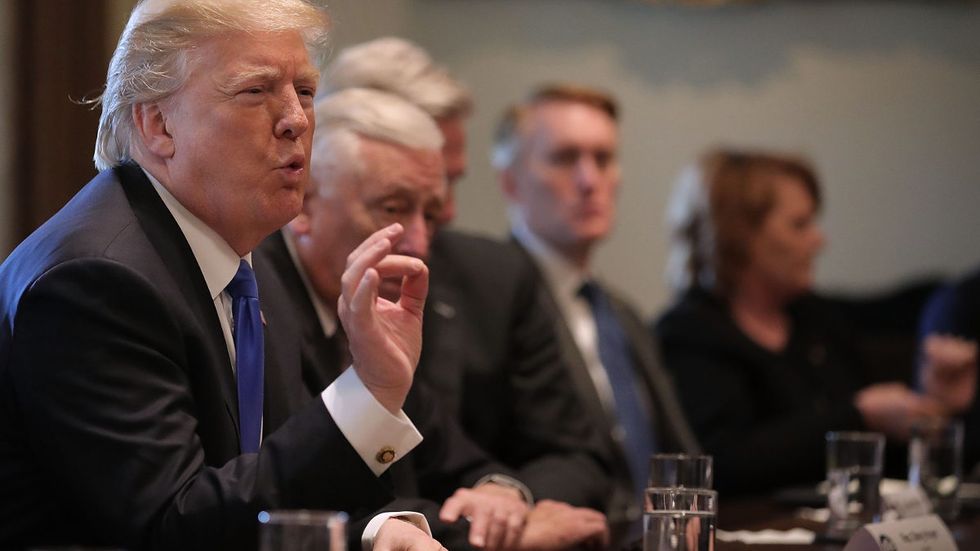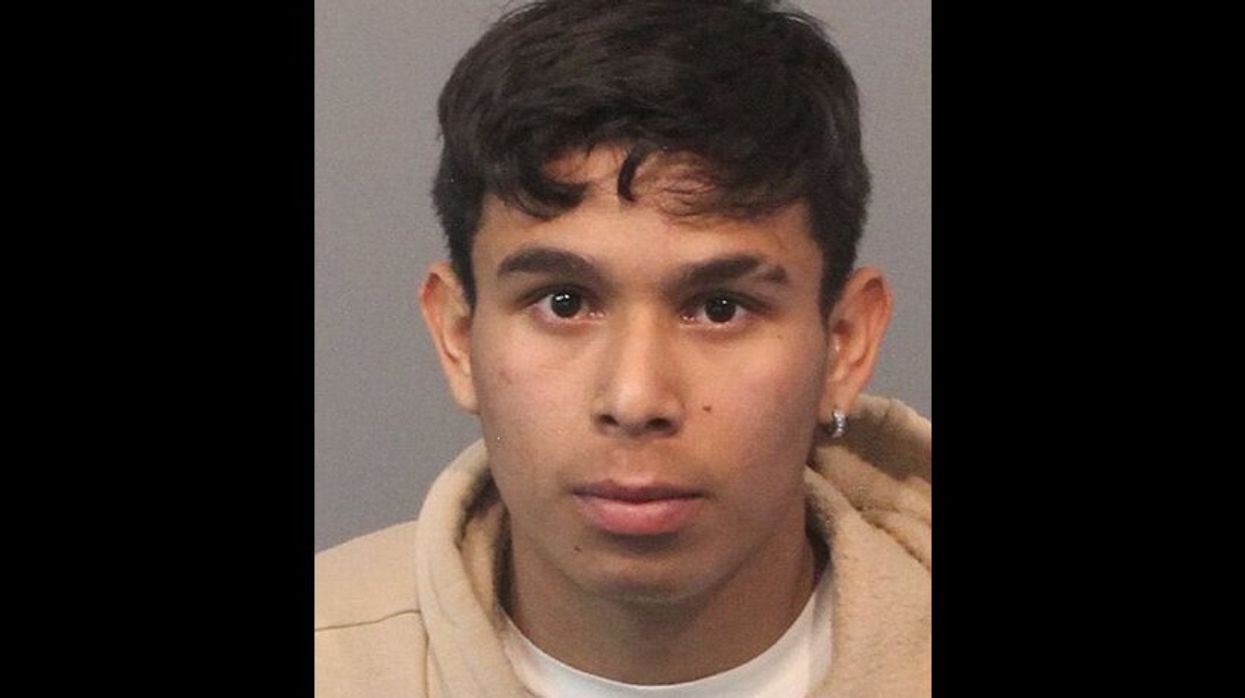
© 2024 Blaze Media LLC. All rights reserved.
In search of a bipartisan compromise on the DACA program for illegal immigrants, a group of Republican and Democratic lawmakers met with President Trump on Tuesday to discuss a path forward on immigration reform and protections for illegal immigrants who arrived in the U.S. as children.
In an unusual move, the press was invited to watch the proceedings, and nearly an hour of the discussion was recorded for TV. The government is rarely so transparent about how the sausage is made.
The president said many surprising things, but generally stuck to his position that there can be no deal on DACA without border security measures.
Here are the highlights:
1) Trump said the DACA fix should be a “bill of love.”
In his opening remarks, President Trump said that any DACA legislation passed by Congress must accomplish three goals: enhancing border security (including funding for a strategic border wall), ending chain migration, and ending the diversity visa lottery.
He also said that it should be a “bill of love,” pushing for bipartisan compromise.
"Having the Democrats in with us is absolutely vital. It should be a bipartisan bill. A bill of love. Truly it should be a bill of love," Trump said.
2) Trump kicked the ball to Congress.
Having outlined his goals, the president told the lawmakers gathered that he would ultimately sign whatever DACA bill Congress presents to him.
“I think my positions are going to be what the people in this room come up with," Trump said.
"I am very much reliant on the people in this room. I know most of the people on both sides, have a lot of respect for the people on both sides ... what I approve is going to be very much reliant on what the people in this room come to me with.”
“If they come to me with things that I’m not in love with, I’m gonna do it because I respect them.”
What the president means by this is unclear. Would he be willing to sign a bill that fails to meet the three goals he outlined for a DACA fix? Trump later insisted that there would be no deal without the wall. If the wall is his red line, which policies would he be willing to concede to the Democrats?
3) Trump seemingly endorsed Dianne Feinstein’s “clean DACA bill first” approach, but then he clarified his position.
In a confusing moment, the president seemed to endorse a suggestion by Sen. Dianne Feinstein, D-Calif., to pass a “clean” DACA bill and return to the controversial issue of securing the border later.
“What about a clean DACA bill now with a commitment that we go into a comprehensive immigration reform procedure?” Feinstein asked.
“I have no problem,” the president said, adding that “we’re going to come out with DACA, and then we can start immediately on phase two, which would be comprehensive immigration reform.”
The president seems to have misunderstood what Feinstein was saying. The California Democrat was offering the classic Democratic bait-and-switch on immigration: amnesty first and border security kicked down the road. House Majority Leader Kevin McCarthy, R-Calif., explained that Feinstein was asking for a DACA bill with no border security measures, prompting Trump to clarify that he considers a “clean” DACA bill to have border security.
“To me, a clean bill is a bill of DACA, we take care of them, and we also take care of security. And the Democrats want border security, too. We started off with Steny (Hoyer) saying, we want security. Everyone wants security. Then we go to comprehensive later on. And maybe that is a longer subject and a bigger subject, and I think we can get that done, too,” the president said.
The White House later clarified that the president opposes a permanent legislative solution for DACA recipients if it does not include border security measures.
Border security measures are the sticking point for Democrats, who are largely unsupportive of building a wall along the southern border.
4) Trump would “take the heat” on a pathway to citizenship.
Addressing future plans for “comprehensive” immigration reform, President Trump suggested that he would be willing to “take the heat” politically for providing a path to citizenship for illegal aliens after the question was raised by Republican senators.
Sen. Chuck Grassley, R-Iowa, was one of the senior GOP lawmakers who voiced support for a deal with a path to citizenship. Sen. Lindsey Graham, R-S.C., warned that conservatives would “beat the crap out of us” for this DACA deal, urging the president to “close the deal.”
"I don't know if the Republican and Democratic party can define love," Graham said, "but I think what we can do is do what the American people want to do."
President Trump expressed optimism that his administration would be able to tackle comprehensive immigration reform after achieving a deal on DACA.
"You want to know the truth?" Trump asked. "If we do this properly, DACA, you're not so far away from comprehensive immigration reform, and if you want to take it that further step, I'll take the heat. I don't care. I don't care. I'll take all the heat you want to give me, and I'll take the heat off both the Democrats and the Republicans."
"My whole life has been heat. I like heat in a certain way," Trump added. "If you want to go the final step, I think you should do it."
5) Trump suggested that Congress bring back earmarks.
At one point, President Trump suggested resurrecting earmarks as a way to get Republicans and Democrats working together again.
“Maybe we should think about it,” President Trump said, reminiscing about the “great friendliness” among Democrats and Republicans in the “old days of earmarks.” “Maybe all of you should think about going back to a form of earmarks. You should do it,” he said, adding that there should be some restrictions.
Trump lamented the “levels of hatred” in Congress, characterizing the deteriorated relationship between Republicans and Democrats as “out of control.”
Earmarks were banned in 2011 after Republicans captured the House of Representatives, campaigning against wasteful earmarks like $223 million for the Bridge to Nowhere. Some House Republicans are hoping to overturn that ban, apparently with the president’s support.
6) Read Trump's lips: There must be a wall.
At one point, Rep. Henry Cuellar, D-Texas, pushed back on President Trump’s demands for a border wall.
“I always get a kick out of people that go down and spend a few hours [at the border]. They think they know the border better than ... some of us there,” Cuellar told the president. Noting that a large percentage of illegal immigrants are here after overstaying their visas, Cuellar attempted to argue there was no need for a border wall.
“You can put the most beautiful wall out there and it’s not going to stop them,” Cuellar remarked.
President Trump immediately pushed right back against the Democrat.
“They say without the wall we cannot have border security,” Trump said. “And all you have to do is ask Israel.”
President Trump has previously cited Israel’s strategic border fencing as an example of border security working to stop illegal immigration. Border apprehensions in Israel dropped from 10,440 in 2012 to just 36 people in 2013.
Repeatedly throughout the meeting, Trump insisted that border fencing must be included in the DACA deal, but also admitted that “we don’t need a 2,000 mile wall.”
“We don’t need a wall where you have rivers and mountains and everything else protecting it, but we do need a wall for a fairly good portion,” Trump said.
The message is clear: Trump will be flexible on immigration reform, even potentially supporting a path to citizenship for illegal immigrants in the future. But if a deal on DACA is going to be made before the March deadline when protections for DACA recipients expire, border security measures and the wall must be included.
Want to leave a tip?
We answer to you. Help keep our content free of advertisers and big tech censorship by leaving a tip today.
Want to join the conversation?
Already a subscriber?
more stories
Sign up for the Blaze newsletter
By signing up, you agree to our Privacy Policy and Terms of Use, and agree to receive content that may sometimes include advertisements. You may opt out at any time.
© 2024 Blaze Media LLC. All rights reserved.
Get the stories that matter most delivered directly to your inbox.
By signing up, you agree to our Privacy Policy and Terms of Use, and agree to receive content that may sometimes include advertisements. You may opt out at any time.



